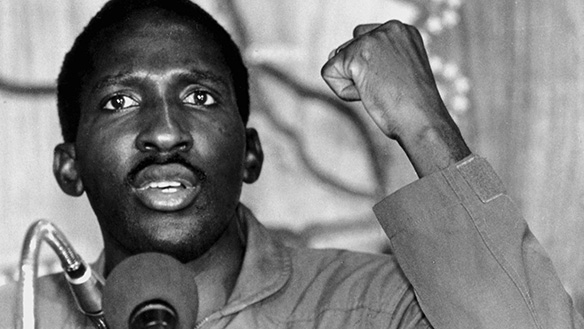

Thomas Sankara, president of Burkina Faso, 1984-1987.
Excerpts from a talk given by Larry Hales to a New York City meeting of Workers World Party on Nov. 7.
In Burkina Faso since the uprising that drove Blaise Compaore from office, Thomas Sankara’s name and contribution to revolutionary thought and the struggle of the Burkinabe people has shone greatly.
I would encourage everyone to study revolutionary leadership in the oppressed world, especially those leaders from Africa, such as Amilcar Cabral, Kwame Nkrumah and Sankara, to name a few. Here is a passage from one of Sankara’s speeches, on International Women’s Day, March 8, 1987:
“The revolution’s promises are already a reality for men. But for women, they are still merely a rumor. And yet the authenticity and the future of our revolution depend on women. Nothing definitive or lasting can be accomplished in our country as long as a crucial part of ourselves is kept in this condition of subjugation — a condition imposed … by various systems of exploitation.
“Posing the question of women in Burkinabe society today means posing the abolition of the system of slavery to which they have been subjected for millennia. The first step is to try to understand how this system functions, to grasp its real nature in all its subtlety, in order then to work out a line of action that can lead to women’s total emancipation.
“We must understand how the struggle of Burkinabe women today is part of the worldwide struggle of all women and, beyond that, part of the struggle for the full rehabilitation of our continent. The condition of women is therefore at the heart of the question of humanity itself, here, there and everywhere.”
The capitalist-controlled media mention the ghost or influence of Capt. Thomas Sankara. Much of it labels him authoritarian, but a few mention some achievements of the revolutionary process of 1983-1987. Female genital mutilation was made illegal, as were forced marriages and polygamy. Women were recruited for high government positions.
Behind Sankara’s assassination
Land was stripped from feudal landlords and redistributed to peasant farmers. Grain production in the country was more than doubled. The country was on its way to becoming self sufficient. Illiteracy was combated and an immunization program was started.
These are just some of the achievements in Burkina, a country that had seen military coup after coup, and why the committees for the defense of the revolution, the armed masses, were being raised up.
The conditions for revolution made it difficult for Burkina Faso as they did for every revolution. I don’t think we can point to a country where there has been a mature capitalist class and the objective conditions for social revolution.
The hardships and contradictions in Burkina Faso were owed in large part to the long history of colonialism and neocolonialism. The assassination of Comrade Sankara, however, was not due to any mistakes but due to the mineral wealth of the country and the dangers to imperialism of a successful and deep-going fundamental social change in Africa in the 1980s.
There are a few groups that claim to uphold the legacy of Thomas Sankara now. The masses have remained in the street as the military has seized power. The people of Burkina demand a return to civilian rule and new elections.
The people of Burkina Faso have a long memory and are refusing to be cowed by violence from the military in the service of Western imperialists. This uprising is not at its end, and we wish a continued path of struggle to end oppression, imperialist domination and superexploitation. The legacy of Thomas Sankara shines brightly.
Down with imperialism! Power to the workers and people of Burkina Faso!
This statement was recently issued by over 30 groups. On Friday, March 28, Dr. Helyeh…
By Jeri Hilderley I long for peace and ease as stress and anxiety overtake me.…
Los siguientes son extractos de la declaración del Gobierno de Nicaragua del 9 de abril…
The following are excerpts from the statement of the Nicaraguan government on April 9, 2025,…
The following is a statement from the organization Solidarity with Iran (SI) regarding the current…
By Olmedo Beluche Beluche is a Panamanian Marxist, author and political leader. This article was…